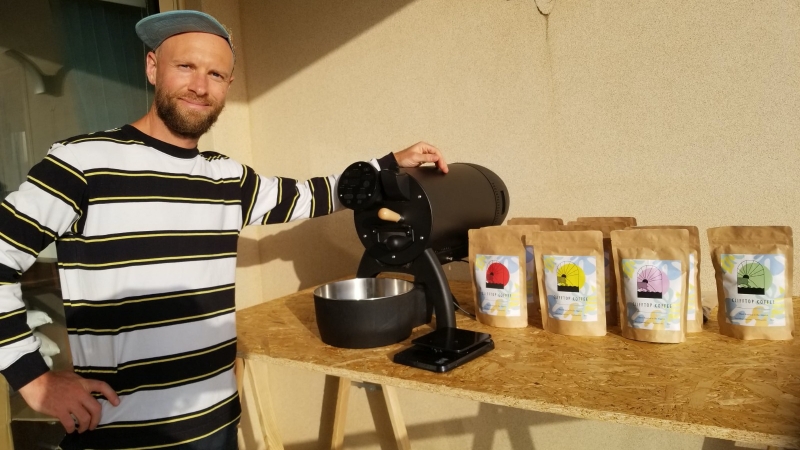By Sophie Sadler
Rhian Gainsborough took his love of coffee to new heights when he developed his clifftop coffee brand. A speciality coffee roastery, sourced responsibly and delivered carbon-neutrally by bike.
If you are wondering how there can be a gap in the market for coffee in a country that has coffee ingrained in its culture with a baffling array of options, then read on. Although you might find a bica of Delta coffee gets your day off to a good start, there is an increasing trend of coffee drinkers for whom a cup of coffee imbues a range of flavours and characteristics similar to a fine glass of vintage wine.
One such coffee connoisseur is Rhian, who moved here 18 months ago and started to search for a good cup of coffee and couldn’t find one! Although he accepts that this might be akin to blasphemy for many Portuguese, he favours a Guatemalan washed coffee that tastes of caramel with hints of red fruits over the “bitter” taste of the local blends.
Rhian has always enjoyed coffee – back in the UK, he roasted coffee at home for six years using popcorn roasters and a small automatic roaster. While travelling in South America, he worked in some coffee plantations and became interested in the coffee “farm to cup” process.

It was here that he had his coffee epiphany. “I was in Peru and stayed at a coffee finca. They ground some coffee and served it in a tin cup – it was delicious – a world away from the minimalist coffee shop.” To prove his point he offers me two different blends of coffee and I am won over by his argument. The Guatemala coffee, grown at high altitude, has an intensity of flavour that gives hints of red fruits. “It is roasted very lightly, so it has a full range of flavour and is full-bodied. Commercial coffee is roasted darker at a very high temperature which makes them more acrid. Supermarket coffee has probably been sitting around for months, and coffee is best drunk fresh.”
During the lockdown, the digital marketeer decided to do an online course in coffee to expand his knowledge. Moving to Portugal to join his girlfriend, who had been working in a surf retreat, he started by importing 20 kilos of beans. Sharing his blends with friends, he got very positive feedback and saw a local demand for his coffee creations. He started a stall at Vivo Mercardo in Lagos. “I enjoy the social element of meeting people and discussing coffee with them. I listen to their preferences and suggest coffees to suit their tastes.”
He roasts the beans in a roasting machine where he controls the temperature to give the flavours he wants. As heat transfers from the machine into the bean, you get the “first crack”, the temperature at which the chemical reaction occurs and when the coffee becomes drinkable. Then he lets the heat descend slowly, which imbues the bean with the flavour. “It’s a science,” he tells me. Rhian’s coffee roaster is linked to a computer that records the temperatures meaning that he can replicate the process when he is happy with the profile.

Rhian sources coffee seasonally from green bean importers that work with a variety of regions including many of the farms he visited. A premium is paid to the farmer for the quality of coffee, often surpassing Fair Trade prices. Many of the coffees are organic, Rainforest Alliance-certified and all traceable back to the farm or washing station of origin. He has the beans shipped to Portugal from a variety of origins, following the coffee harvesting seasons to ensure the coffee is fresh and ever-changing.
A keen cyclist, Rhian tries to deliver as much as he can on his road bike to be sustainable and his unique cottage industry is certainly on the road to success.
Excitingly, Rhian also has another “bean” in the oven. His partner is expecting a baby any day, so it seems that he will certainly be needing more coffee in the upcoming months to cope with those sleepless nights! Good luck, Rhian.













